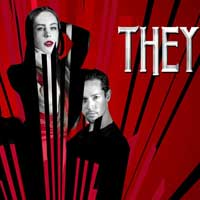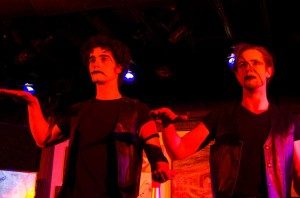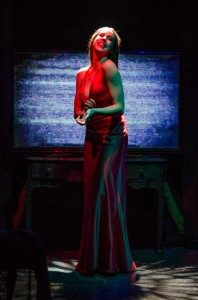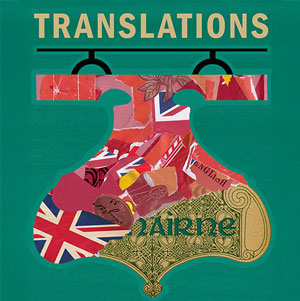
 [rating=3] Do you ever think that artists’ sniping at each other isn’t really helping them to become better at resisting totalitarianism? That certainly appears to be the case in They, the new adaptation by Trap Door Theatre artistic director Beata Pilch of a 1920 play by Stanislaw Ignacy “Witkacy” Witkiewicz. One of the most influential figures in Polish theatre, Wiktiewicz was also a painter, essayist, and experimenter with hallucinogens whose absurdist works satirized the rapidly changing culture and plethora of ideologies of the interwar era. Deeply concerned with what he saw as the mechanization of human beings, Witkiewicz’s dark comedies eschewed realism in favor of a style of storytelling that worked on its own terms and came to define Eastern European theatre post-Stalin. Pilch’s pared-down adaption is highly energetic and amusing for its entire eighty-minute run, during which its artist protagonists are drawn into the clutches of “a secret government conspiracy that controls everything” which openly proclaims itself.
[rating=3] Do you ever think that artists’ sniping at each other isn’t really helping them to become better at resisting totalitarianism? That certainly appears to be the case in They, the new adaptation by Trap Door Theatre artistic director Beata Pilch of a 1920 play by Stanislaw Ignacy “Witkacy” Witkiewicz. One of the most influential figures in Polish theatre, Wiktiewicz was also a painter, essayist, and experimenter with hallucinogens whose absurdist works satirized the rapidly changing culture and plethora of ideologies of the interwar era. Deeply concerned with what he saw as the mechanization of human beings, Witkiewicz’s dark comedies eschewed realism in favor of a style of storytelling that worked on its own terms and came to define Eastern European theatre post-Stalin. Pilch’s pared-down adaption is highly energetic and amusing for its entire eighty-minute run, during which its artist protagonists are drawn into the clutches of “a secret government conspiracy that controls everything” which openly proclaims itself.
For this production, Trap Door’s space is filled with an actual painting exhibit by artists whose catalogue may be perused by patrons. Hosting the exhibit is Spika, Countess Tremendosa (Mary-Kate Arnold), the mistress of the in-universe mastermind behind the gallery, the great Callisto Balandash (Carl Wisniewski). An interview with Balandash is playing on a TV monitor. In it, he informs his interviewer that art studies him, not the other way around, among other blunt assessments of his own genius.
Balandash and Spika’s relationship isn’t at it’s best. She is irritated by the nonsensical pseudo-intellectual lines in a play she’s rehearsing; he questions her intellectual sophistication and whether theatre is really capable of sustaining a movement of pure forms, like his painting. She wishes he would demonstrate a deep feeling, or at least sexual interest, and blames every questionable artistic choice she encounters on male ego. He doubts the existence of the secret government conspiracy which controls everything despite rumors that “they”, it’s agents, are literally on his doorstep and proclamations on television that his gallery has already been slated for suppression. When the inspector, Seraskier Banga Tefuan (Adam Huizenga) arrives in his intimidatingly red slacks, accompanied by his lackey, Col. Melchior Fondoloff (Daniel Chenard), Balandash can do little but cower as his life is torn apart. It’s not just the gallery they’ve come for either: Spika’s theatre, and all other creative outlets that do not serve their purpose are in danger, but not from such direct interference as they can afford to subject Balandash to.
Pilch and choreographer Kase Foster infuse an enormous amount of movement into Balandash and Spika’s squabbling. Arnold and Wisniewski are hilarious and play off each other, verbally and physically, with perfect timing. Adding a new dynamic just before they get tiresome, Huizenga and Chenard’s bro-y fascists are a pair of silvery-tongued clowns whose aggressive movements resemble house music dances (with accompaniment by sound designer Danny Rockett). There’s even a good dramaturgical reason for this: Tefuan’s preferred ideology is the very automation of thought and body Witkiewicz abhorred, but he and Fondoloff still get to deliver some of the play’s most cutting arguments and driest wit. Rather unexpectedly, they come across as more charming and human than Balandash, and have a more supportive relationship with each other than Balandash does with Spika.
There is a fifth cast member: Rosika Pillory, a “Dark Woman” Balandash longs for, played by Halie Ecker. Mostly seen gyrating in a car commercial (videography by David A. Holcome), she serves the titular “they” by conflating the desire for human connection with the Futurist admiration for the speed, strength, and precision of machines. Like everything else, this is done in an over-the-top, arch manner, but as we learn more about the secret government conspiracy’s methods, it becomes more sinister. There’s a Pinteresque feeling of dread in everything that goes on in They, even with all the humor of Pilch’s adaptation. Tefuan’s plot to subvert the independent voice of the theatre by filtering it through channels under the control of his machines probably sounded like science-fiction in 1920, but there’s nothing metaphorical about it today. How many reviews have you read because an algorithm showed them to you?
 They will continue at Trap Door Theatre, 1655 W Cortland Ave, Chicago, thru January 13, 2018, with performances as follows:
They will continue at Trap Door Theatre, 1655 W Cortland Ave, Chicago, thru January 13, 2018, with performances as follows:
Thursdays: 8:00 pm
Fridays: 8:00 pm
Saturdays: 8:00 pm
Tickets are $20-25 with 2 for 1 admissions on Fridays. To order, call 773-384-0494 or visit TrapDoorTheatre.com.
Running time is eighty minutes.
Metered parking is available in the neighborhood.
To see what others are saying, visit www.theatreinchicago.com, go to Review Round-Up and click at “They.”






More Stories
“Translations”
“The Firebugs” reviewed by Julia W. Rath
“The Book of Grace” Al Bresloff with another from Paul LIsnek